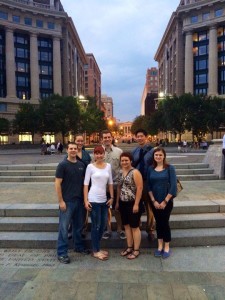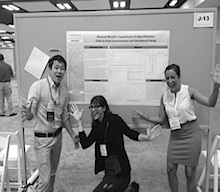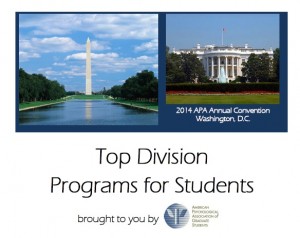Traveling to Toronto, Canada for the APA Convention this August? Interested in becoming more involved with the APAGS? Then you’ll want to apply for the APAGS Convention Travel Award! This award provides reimbursement of $500 to up to five psychology graduate students who are first-time attendees at convention.
The Perks of the Award
In addition to the financial incentive (i.e., $500 in US currency equals roughly $640 in Canadian dollars at the moment!), this award gives you the fantastic opportunity of connecting with APAGS leadership through an organized networking opportunity at convention that connects you directly with student leaders already engaged in the ongoing advocacy work of APAGS!
Past awardees have had great experiences at convention through their engagement with APAGS. Aubrey Carpenter of Boston University attended the 2014 Convention in Washington DC and described one of her favorite moments of convention:
“One of the convention highlights for me was attending the APAGS predoctoral internship presentation, which was much more in-depth and practical than I had anticipated…there was a range of students in the audience and yet everyone seemed to take away something personally meaningful.”
Katy Haynes Owen of the University of Kentucky, now a member of the APAGS Convention Committee, also enjoyed APAGS events at Convention in 2014, participating in an APAGS Social Hour:
“I met other graduate students from around the country and connected around our similar research and advocacy interests. Also, I met SEVERAL internship training directors and continued to correspond with them after Convention.”
Some Tips for your Application
Past award winners have some advice for interested graduate students that may help you structure a successful application.

Awardee Jeremy Jinkerson (far left) at the 2014 APA Convention in Washington, DC among other student members of Division 19
2014 awardee Jeremy Jinkerson of Fielding Graduate University noted, “What may have stood out about my application was that I had specific plans for what I would do at Convention. I really needed to be there. You might find success in taking a similar tactic.”
Another 2014 awardee Jackie Newman recommended seeing Convention as more than a one-time event and more as a step towards your future goals: “I would consider carefully not only how the conference might enable your growth right now, but also how you might be able to meet future professional goals by participating in convention.”
What to do to Apply
1) Check your eligibility! You must be a current APAGS member in your first four years of graduate training in psychology. You also have to be in good academic standing. The link above has all the information that you need!
2) Prepare a cover letter (up to 750 words) outlining your interest in becoming a leader in APAGS and APA along with your interest in attending convention. Also send in an abbreviated 2-page vita listing your past attendance and presentations at academic and professional conferences!

Awardee Brian Keum giving his first ever poster presentation at the 2013 Convention in Honolulu, HI



 Psychology graduate students: Now is the time to start thinking about presenting your work at the prestigious 2015 APA Convention in Toronto, Ontario! The deadline to submit a proposal is December 1, 2014.
Psychology graduate students: Now is the time to start thinking about presenting your work at the prestigious 2015 APA Convention in Toronto, Ontario! The deadline to submit a proposal is December 1, 2014. 
 So you’ve registered for the convention and booked your flights and hotels. You have tried to look at the monster programming book but are feeling overloaded and overwhelmed. What is a grad student to do? Have no fear! The APAGS Convention Committee has some untold secrets to navigating convention!
So you’ve registered for the convention and booked your flights and hotels. You have tried to look at the monster programming book but are feeling overloaded and overwhelmed. What is a grad student to do? Have no fear! The APAGS Convention Committee has some untold secrets to navigating convention! Consider going to one of their business meetings. You can learn a lot about current topics and become more aware of potential opportunities for graduate students.
Consider going to one of their business meetings. You can learn a lot about current topics and become more aware of potential opportunities for graduate students.![MPj04025130000[1]](http://www.gradpsychblog.org/wp-content/uploads/MPj040251300001-300x300.jpg) Free food is everywhere at convention! For example, graduate students can come to the APAGS suite for the Food for Thought breakfasts where they can enjoy breakfast while conversing with some of the field’s most influential psychologists. This year we have Dr. Robert Levine, Dr. Mitchell Prinstein, and Dr. Robert Sternberg. Students can also find free food at some of the presentations. Keep an eye out for large groups of people!
Free food is everywhere at convention! For example, graduate students can come to the APAGS suite for the Food for Thought breakfasts where they can enjoy breakfast while conversing with some of the field’s most influential psychologists. This year we have Dr. Robert Levine, Dr. Mitchell Prinstein, and Dr. Robert Sternberg. Students can also find free food at some of the presentations. Keep an eye out for large groups of people!